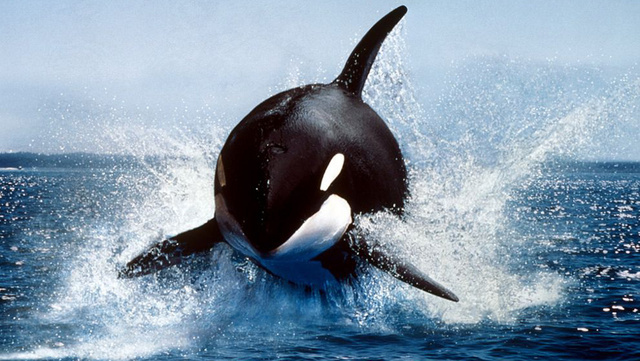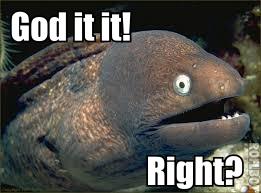It looks like you're using an Ad Blocker.
Please white-list or disable AboveTopSecret.com in your ad-blocking tool.
Thank you.
Some features of ATS will be disabled while you continue to use an ad-blocker.
9
share:
All whales and dolphins are descended from terrestrial mammals, ancient creatures that were very similar to the modern hippopotamus. Now, a fascinating new genetics study shows the incredible evolutionary changes these animals had to experience to become the perfectly adapted marine animals we see today.
Biologists aren't entirely sure which creature modern cetaceans (dolphins, whales, and porpoises) are descended from. The traditional theory suggests mesonychids, an extinct order of carnivorous ungulates (hoofed animals) which resembled wolves. But more recent genetic analysis points to artiodactyls, a hippo-like creature. Regardless, all cetaceans were land mammals at one point in their evolutionary history — and they had to undergo some rather remarkable changes to adapt to underwater life.
Recently, researchers from Korea Institute of Ocean Science and Technology, Korea Genome Research Foundation, BGI, and other institutes, performed a comprehensive analysis of the genomes of several cetaceans, including the minke whale, fin whale, bottlenose dolphin, and a finless porpoise. They did so to improve their understanding of the evolutionary changes required for terrestrial mammals to adapt to the ocean — but at the level of the genome.
read more at io9
This is a good article on the genetic research being done to identify the genetic processes that had to take place for our current aquatic cousins to have adapted the way they have. Included in the article there is a link also here on how a whale can hold its breath underwater for up to an hour this may have some medical value to humans in the future. All the adaptations that had to occur to move their home from land to water must have been quite a process. Anything and everything dealing with the oceans have always been a passion of mine. Hopefully in the next few years I will be trading in my land legs for sea legs as of right now I am researching the boat market for a sailboat.
AS an ex biologist, this fascinates me. Some studies even indicate mankind has made a move back to the sea, witness the sub cutaneous layer of fat
found in our primate bodies. This is a trait needed for aquatic adaptation. Just today, something immense leapt our of the water in our canal, one
of our cousins or one damn big fish.
Luck finding a sailboat, I made the transition many years ago and now have rebuilt an old Prout 31 catamaran which is front of our home, love this boat. Guy on next canal can't get a buyer for his catamaran however, but this is off subject. Well not, sailors never get far from their first love.
Luck finding a sailboat, I made the transition many years ago and now have rebuilt an old Prout 31 catamaran which is front of our home, love this boat. Guy on next canal can't get a buyer for his catamaran however, but this is off subject. Well not, sailors never get far from their first love.
I don't know so much about whales evolving on the land and turning marine. The evidence strongly looks like the other way around ,with all the
beachings around the World. Looks like they are in a hurry to grow legs to me.
edit on 26-11-2013 by 13th Zodiac because: (no reason
given)
Aside from being a little bit envious that you are in the market for a new boat (I couldn't possibly consider such a thing, but would love to), I'm
fascinated with a story like this.
It has crossed my mind a few times in the past, just how could it have been that dolphins, whales and other such creatures, 'returned' to the sea, after being land animals.
The very idea that an animal decided to take to the waters again, after life originally crawled from the sea all those millions of years ago, is amazing. Life, developing to live on land, evolving then evolving to live back in the seas is certainly fascinating.
It would be great to learn more about the land animals that these present day creatures evolved from. What did they eat, where did they live, did they live in the vicinity of large bodies of water, was their habitat flooded over time? Just a few of the many questions that I feel are raised by these ideas.
I'll certainly hope to learn more about this in future.
Thanks for bringing it here.
It has crossed my mind a few times in the past, just how could it have been that dolphins, whales and other such creatures, 'returned' to the sea, after being land animals.
The very idea that an animal decided to take to the waters again, after life originally crawled from the sea all those millions of years ago, is amazing. Life, developing to live on land, evolving then evolving to live back in the seas is certainly fascinating.
It would be great to learn more about the land animals that these present day creatures evolved from. What did they eat, where did they live, did they live in the vicinity of large bodies of water, was their habitat flooded over time? Just a few of the many questions that I feel are raised by these ideas.
I'll certainly hope to learn more about this in future.
Thanks for bringing it here.
reply to post by dampnickers
Like you I have wondered about it myself on many ocaisons. Living in florida always seeing manatees in the canals it made me wonder how they even survived being so slow and docile then I remember they don’t have any real natural preditors except maybe when they are young that being aligators. The biggest threats to them are motor boats I always see scars on them from propelors.
Until man came in with motor boats they were not threatened by much. (Side note the first sailors here mistook them for mermaids... man they had to be drunk and hard up)
Like you I have wondered about it myself on many ocaisons. Living in florida always seeing manatees in the canals it made me wonder how they even survived being so slow and docile then I remember they don’t have any real natural preditors except maybe when they are young that being aligators. The biggest threats to them are motor boats I always see scars on them from propelors.
Until man came in with motor boats they were not threatened by much. (Side note the first sailors here mistook them for mermaids... man they had to be drunk and hard up)
reply to post by Grimpachi
I vaguely recall some folk tale or myth from South America saying whales and dolphins came out of the ocean to live on land then went back to the water. Anyone else hear of this?
Good catch btw.
I vaguely recall some folk tale or myth from South America saying whales and dolphins came out of the ocean to live on land then went back to the water. Anyone else hear of this?
Good catch btw.
Evolution? If so it wasn't on earth. And the thing is, evolution seems to happen in mysterious boosts, as if there is a team with science lab doing
it.....
whales hu pengwins a bird or?? yea evolution no way lol
ever stop and think a chicken came from a bird taht could fly less then oo 6 or 8 thousand years back .
That chawwaw is a wolf ((you can tell by how they love biting ankles lol
nope evolution cant possibly be real no evedence . lol
ever stop and think a chicken came from a bird taht could fly less then oo 6 or 8 thousand years back .
That chawwaw is a wolf ((you can tell by how they love biting ankles lol
nope evolution cant possibly be real no evedence . lol
reply to post by midnightstar
Chicken or egg …..evidence points to T-Rex of course creationist recreations say otherwise I saw one when I was a kid it even had a theme song.

live science
Chicken or egg …..evidence points to T-Rex of course creationist recreations say otherwise I saw one when I was a kid it even had a theme song.

An adolescent female Tyrannosaurus rex died 68 million years ago, but its bones still contain intact soft tissue, including the oldest preserved proteins ever found, scientists say.
And a comparison of the protein's chemical structure to a slew of other species showed an evolutionary link between T. rex and chickens, bolstering the idea that birds evolved from dinosaurs.
live science
reply to post by dampnickers
A vast area of dry ground slowly turning into saltmarsh and wetland. Diminished habitat and livelihood resources available to the terrestrial quadrupeds that inhabit the area. They must adapt or die out. So natural selection in that region features waders over walkers, swimmers over waders. Over time the mutations add up.
It has crossed my mind a few times in the past, just how could it have been that dolphins, whales and other such creatures, 'returned' to the sea, after being land animals.
A vast area of dry ground slowly turning into saltmarsh and wetland. Diminished habitat and livelihood resources available to the terrestrial quadrupeds that inhabit the area. They must adapt or die out. So natural selection in that region features waders over walkers, swimmers over waders. Over time the mutations add up.
new topics
-
Who's coming with me?
General Conspiracies: 13 minutes ago -
FBI Director CHRISTOPHER WRAY Will Resign Before President Trump Takes Office on 1.20.2025.
US Political Madness: 3 hours ago -
The NIH is still sending taxpayer money to Chinese Labs to Conduct cruel animal experiments
Mainstream News: 4 hours ago -
Angela Merkel is terrified of dogs
Politicians & People: 5 hours ago -
Will all hell break out? Jersey drones - blue beam
Aliens and UFOs: 11 hours ago
top topics
-
The NIH is still sending taxpayer money to Chinese Labs to Conduct cruel animal experiments
Mainstream News: 4 hours ago, 11 flags -
FBI Director CHRISTOPHER WRAY Will Resign Before President Trump Takes Office on 1.20.2025.
US Political Madness: 3 hours ago, 8 flags -
Should be BANNED!
General Chit Chat: 14 hours ago, 6 flags -
Will all hell break out? Jersey drones - blue beam
Aliens and UFOs: 11 hours ago, 4 flags -
Angela Merkel is terrified of dogs
Politicians & People: 5 hours ago, 2 flags -
Who's coming with me?
General Conspiracies: 13 minutes ago, 0 flags
active topics
-
FBI Director CHRISTOPHER WRAY Will Resign Before President Trump Takes Office on 1.20.2025.
US Political Madness • 10 • : VariedcodeSole -
And Here Come the Excuses!!
General Conspiracies • 132 • : Flyingclaydisk -
Who's coming with me?
General Conspiracies • 4 • : AlroyFarms -
-@TH3WH17ERABB17- -Q- ---TIME TO SHOW THE WORLD--- -Part- --44--
Dissecting Disinformation • 3613 • : Thoughtful3 -
Salvatore Pais confirms science in MH370 videos are real during live stream
General Conspiracies • 237 • : b0kal0ka -
Will all hell break out? Jersey drones - blue beam
Aliens and UFOs • 35 • : Xtrozero -
Angela Merkel is terrified of dogs
Politicians & People • 4 • : andy06shake -
Petition Calling for General Election at 564,016 and rising Fast
Political Issues • 158 • : Oldcarpy2 -
Drones over New Jersey
Aliens and UFOs • 39 • : ratcals -
Drones everywhere in New Jersey
Aliens and UFOs • 55 • : MetalThunder
9


